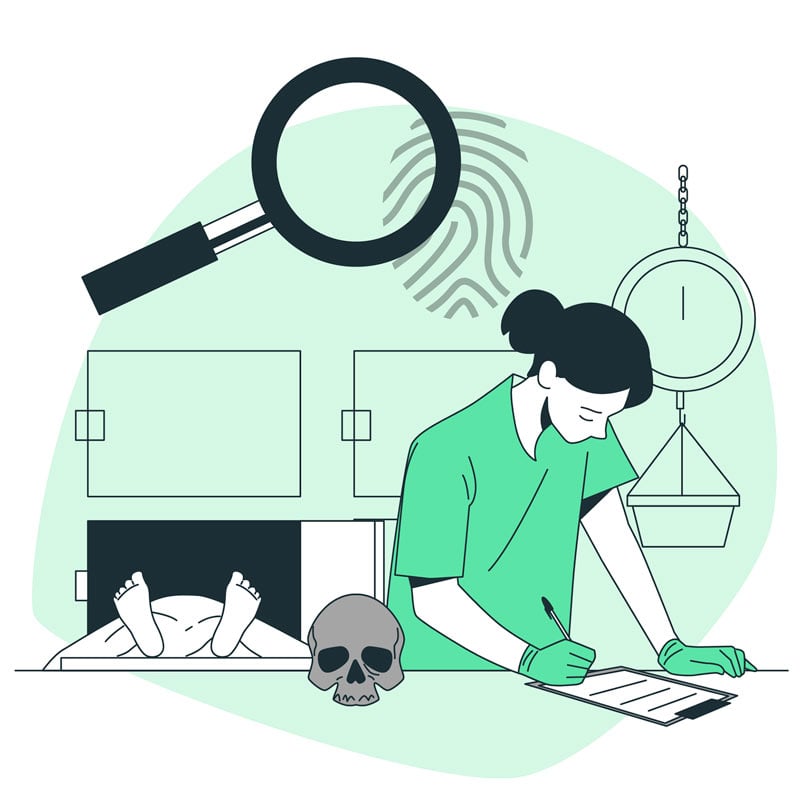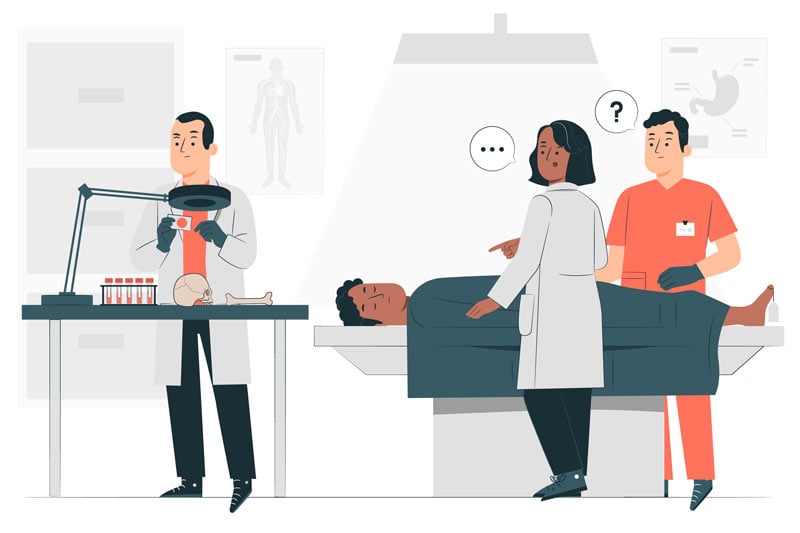
- Forensic medicine specialization
- What is the specialty of forensic medicine or forensic medicine?
- History and upbringing of forensic medicine
- The importance of forensic medicine in our lives and its most important features
- What are the tasks and actions of the "forensic" forensic doctor?
- Areas of forensic work
- Which universities study this specialty?
- What are the courses for the specialization of forensic medicine?
- FAQs About Forensic medicine major
What is the specialty of forensic medicine or forensic medicine?
Forensic or forensic medicine is a specialty of medicine dealing with criminal legal cases, specializing in investigating deaths and injuries in mysterious, unknown, and abnormal circumstances; examining and detecting the effects that caused death or illness; motives; and unclear causes of crime; whether these effects are external or internal, such as suicide, poisoning, or murder; determining the time of death; examining and dissecting bodies and verifying their identity, as required by criminal laws and civil law. It includes the application of scientific and medical procedures to vague legal problems and issues and linking medical assets to complex legal problems. In many countries, forensic medicine belongs to judicial institutions much more than health institutions, and the study may vary from country to country.
History and upbringing of forensic medicine
Forensic medicine is not modern medicine. Its roots date back to the sixth millennium BC, when both Egyptian, Sumerian, and Babylonian civilizations contributed to the development of this science, and "Imhotep" is probably the first medico-legal expert, where he served as the supreme judge and chief medical officer in ancient Egypt, and also contributed to the development of this medical specialty by the Greek doctor Abu Karrat and the Romanian doctor Galen. In the 7th, 8th, and 19th centuries, German-speaking European cities, including Freiburg and Vienna in 1804, organized many forensic lectures, and German scientists' interest in this field at the beginning of the nineteenth century was the nucleus of modern forensic medicine. In the United States of America, forensics was not recognized as an independent science until 1959, while Canada did not recognize forensics until 2003. Forensic medicine is a specialty that has existed since ancient times and has not disappeared as the ages have progressed but have undergone many changes that have contributed to its development.

The importance of forensic medicine in our lives and its most important features
Forensic medicine has an important positive and scientific role to play in the service of justice by providing scientific findings in criminal cases, helping to uncover the criminal evidence that leads to the mysterious crime, and contributing significantly to the removal of confusion among judges when the investigation is unable to uncover the crime circumstances and the perpetrators. It is also of great importance in its dealings with the judiciary to establish the principle of justice in society and everything related to human rights. It discovers the date and cause of the injury, its character, and knows the tool of the crime. If there was no forensic medicine, the crime would have spread and the criminals' devices would have increased to escape punishment, as the covering of the crime and knowing its causes and perpetrators greatly limit the commission of crimes.
Relationship of forensic specialization to other disciplines
Since the specialization of forensic medicine is a branch of medicine, it is closely linked to natural sciences, such as tissue science, biology, biosciences, genetics, chemistry, psychiatry, toxicology, a branch of chemistry, biology, and pharmacy, and forensic medicine studies the relationship between natural facts and legal texts, thus making the specialization of forensic medicine linked to the rest of the disciplines.
What are the tasks and actions of the "forensic" forensic doctor?
The tasks of the criminal doctor are many, and he has significant responsibilities that are not allowed to be mistaken, including:
- Go to the crime scene when it happens and gather evidence.
- Supervising the investigation. Investigation of unprovoked, sudden, and mysterious murder cases He asked for an investigation into a case.
- Issuing death certificates related to mass disasters such as fires and explosions, and keeping death records.
- Determining the causes, time, and instruments used in the crime.
- Taking samples of the body to identify the victim.
- Issuing orders relating to burial, opening of the grave, exhumation, and autopsy.
- Issuing orders for pretrial detention, arrest, and consideration of hearings with jurors and defendants. Detection of causes of injury and death after the autopsy.
- Approval of the use of body parts in scientific research.
- Inform the families of the victims of the steps that will be taken step by step.
- Explain all the operations that were carried out on the body and the results of the examination to the concerned authorities.
- Gathering evidence and evidence.
- Collecting and examining tissue samples in laboratories to determine the presence or absence of diseases or toxic substances in the tissues and fluids of the body.
- Make final decisions and request the closure of cases.
- Work and coordinate with official criminal investigation bodies such as the Criminal Court, toxicology laboratories, and criminal laboratories.
- Testifying in the courts concerning legal and criminal cases.

Areas of forensic work
- Working with government agencies competent for criminal investigations.
- Working in the courts.
- Working in laboratories and autopsy departments in hospitals.
- Working in the field of cybercrime.
- Presentation of introduction and awareness lectures on forensic topics.
Highlights of forensic specialization challenges
To obtain a certificate authorizing him to work as a forensic doctor, the student must study medicine, specialize in forensic medicine, and pass university tests.
A student who is studying in the field must make the utmost effort to obtain high grades that will entitle him to enter the labor market and excel in his field, to graduate as a forensic doctor who is fully qualified, and to always reach the truth and find information based on evidence.
This field requires a lot of accuracy, intelligence, and statesmanship. If the student wishes to study this specialization in Turkish universities, he or she must pass the abilities exam for admission to the Turkish state universities (yös), or the "SAT" test (mathematics and English test), while private universities do not require entrance examinations only for the presence of a high school certificate with good grades and a good level in Turkish and English, and if the student does not have the language, the university gives him a preparatory year to study it.
After graduation, the criminal doctor faces problems and difficulties, which consist of knowing the perpetrators, revealing their identity, and identifying the causes of injuries, deaths, and motives behind the crimes.
The forensic doctor must also be bold; sometimes the scenes are harsh, decision-making is difficult, and it can require an effort to detect mysterious cases, which sometimes cause anxiety and stress.

What are the best countries in the world for forensic jobs?
The United States of America, Canada, the Arab Gulf states, and European countries are among the best in the world, and the function of forensic medicine is highly regarded on the job ladder and high income, encouraging learners to look for opportunities to meet their ambitions.
The most important skills and requirements of the work of the forensic doctor
It is customary that the profession of a forensic doctor is difficult and sensitive, there must be some skills among doctors, including:
- Intelligence, accuracy, and attention to detail.
- The speed of intuition.
- Scientific and critical thinking.
- Logical analysis in scientific ways.
- The ability to deal with difficult situations.
- Honesty and honesty to testify in the courts.
- Boldness and skill in communicating with others.
- Self-control and emotion control.
- The ability to work under the pressure of work.
- Cooperation and the spirit of teamwork.
Which universities study this specialty?
Since the specialization of forensic medicine is a specialty that cannot be replaced or dispensed with, it is taught at various universities around the world, including:
- Oxford University and Cambridge University in Britain.
- Stanford University and Johns Hopkins University in America.
- University College London.
Turkish universities are among the best universities in the world to study medical and health specialties, study the specialization of forensic medicine in the best university "Uskudar University". It has laboratories equipped with the latest technology, providing students with the opportunity to carry out practical applications for forensic examinations, accompanied by a selection of teaching staff.
What are the courses for the specialization of forensic medicine?
Courses and subjects taught in the specialization of forensic medicine vary from country to country and from university to university, but here are some important subjects taught in universities:
In the first year:
The student studies basic subjects in medicine:
- Chemistry
- Biology
- Physics
- Statistics
- English
In the second and third years the student studies:
- Physiology
- Pathology
- Biochemistry
- Tissue Science.
- Microbiology
Then followed by the stage clinical years, the fourth and fifth year in medicine, after which the student chooses the specialization that suits him:
- Human Medicine.
- Pediatrics
- Adult Medicine.
- Gynecology
- Geriatrics
- Internal Medicine.
- Orthopedics
- General Surgery.
- Neurosurgery
- Ophthalmology
- Ear and throat surgery.
- Psychiatry
Then, is followed by a residency program that can take from three to six years after which the doctor becomes a specialist, and a fellowship of two to three years after which he becomes a specialist and consultant, an academic study by those who wish to complete an academic career.

The 5 most famous figures in the field of forensic medicine
The list of personalities that have contributed, developed, and become famous in the field of forensic medicine goes on and there are a large number of prominent names, all of which have worked to establish and develop the stages of this stand-alone science, the most famous of which must be mentioned: "Carl Bernhard Lehmann, Johan Ludwig Casper, Wolfgang Heinz, and the French doctor Auguste Amboise radio". The profession of the forensic doctor is noble and fair, and it is also a rare specialization in the world, so it is required in the labor market. Its salaries are high compared to the salaries of other professions, and the study of this specialization is enjoyable and interesting. It qualifies the person to work in a profession full of mysterious events and a spirited atmosphere, and it combines medicine and law, as the graduate of this specialization can work in judicial forums and hospitals, so the forensic doctor contributes significantly to the achievement of justice in society by uncovering the circumstances of the crime, and assisting the judges, especially now that the crime rate has increased. If you want to study at a Turkish university, the study platform helps you choose the best universities that suit your wishes and provides the best study services to foreign and Arab students, with its long-standing experience and professional staff.
FAQs About Forensic medicine major
Since the specialization of forensic medicine is a specialty that cannot be replaced or dispensed with, it is taught at various universities around the world, including:
- Oxford University and Cambridge University in the U.K.
- Stanford University and Johns Hopkins University in the USA.
- University College in London.
Turkish Universities are among the best universities in the world to study medical and health specialties, studies the specialization of forensic medicine in its best university "Üsküdar University" and has laboratories equipped with the latest technology, providing students with the opportunity to carry out practical applications for forensic examinations, accompanied by a selection of teaching staff.
To become a forensic doctor, he must first obtain a high school diploma with excellent grades, then attend medical school and pass university exams to reach residency, in which the doctor studies for four years in the following areas: anatomy, genetics, toxicology, and psychiatry, after which he becomes a forensic doctor.
The fields of medicine, in general, are difficult, and there is no doubt that the specialization of forensic medicine is considered one of the most difficult and not easy, and the years of study and the subjects studied require the student to exert time and effort to excel and reach the desired goal, and the conditions required by this profession and how to work in it, but with work and practice, the profession is easier.
The specialization of criminal medicine certainly has a future. As long as crimes exist, there must be discoverers of them, and for the reasons for their occurrence, there is a shortage of specialists. The salaries of workers in this field are high, jobs are available after graduation, and there is a need in the labor market according to the state where the specialist in forensic medicine is located.
The specialization in forensic medicine is certainly considered required and many. Because of the small number of pioneers of this specialization, the need for medical specialties of all kinds and departments cannot be abandoned, and the need for those who seek justice and uncover criminals is an urgent need to achieve safety and stability in various countries of the world.
Forensic departments are many and varied, the most important are:
- Pathology: Determines the cause and time of death, through autopsies.
- G.I.: Takes care of issues of the human dimension such as abortion, sexual assaults, etc.
- Forensic toxicology: It identifies toxic substances and others that were used at the crime scene.
- Forensic psychiatry: In which the doctor assesses the patient's or the accused's psychological and mental condition, and the motives behind the crimes committed, to determine the possibility of prosecuting the perpetrators for the crimes they committed.
The salaries of workers as criminal doctors vary from country to country and vary according to the doctor's experience and rank, so in European countries they are high, but in the Gulf countries they are medium to high, and in the Middle East countries they are medium.
Edited by Al-Dirasa Platform©
Did you like this topic? You can share it with your friends now.






